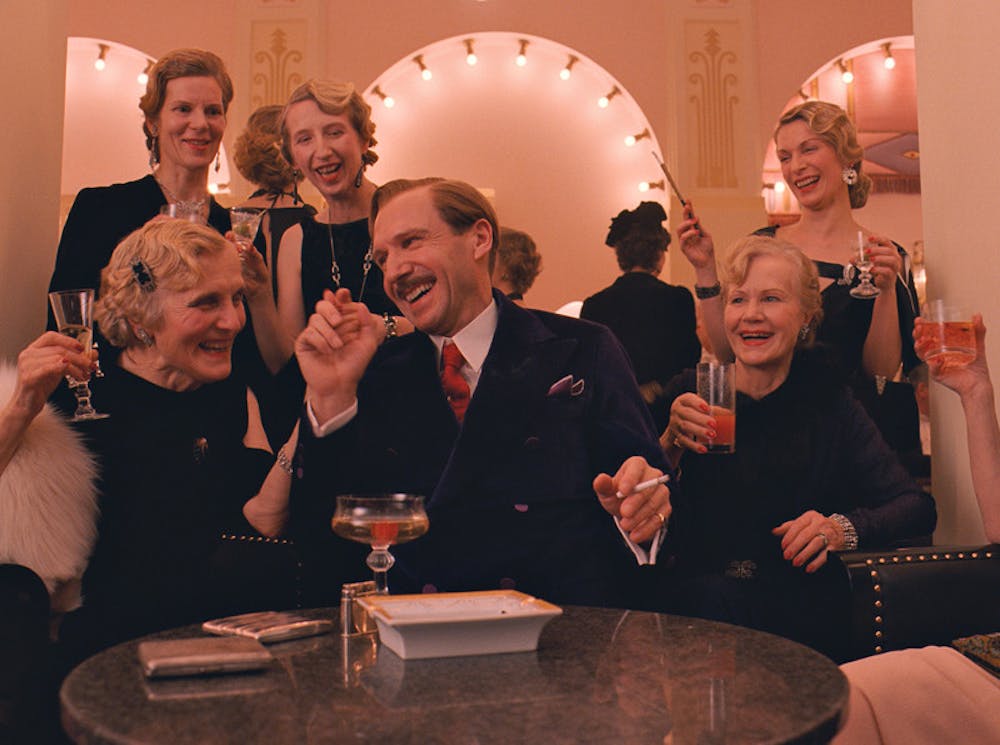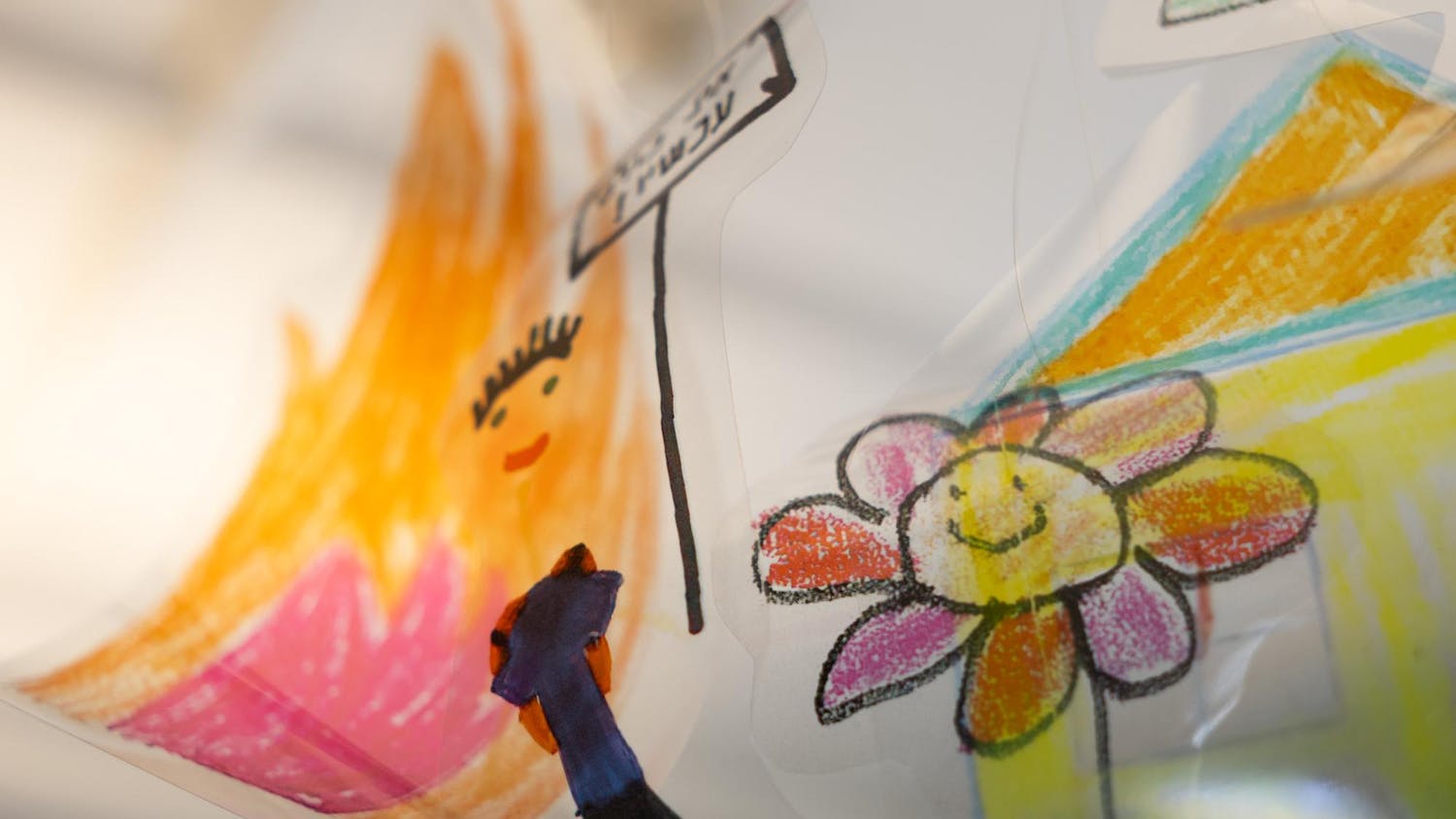In 1993, Ralph Fiennes harrowed audiences as Nazi war criminal Amon Goeth, calmly sniping concentration camp workers from his balcony for nothing more than pre-breakfast entertainment. Twenty-one years later, the “Schindler’s List” actor stars in “The Grand Budapest Hotel,” a film currently playing at the Avon Cinema that is just as intent on exploring humanity among those affected by World War II.
But this artistic interpretation finds Fiennes not making others run as a Nazi, but running from ZZs. Short for “Zig Zags,” these goofy goose-steppers are hilariously and conveniently inept at aiming firearms. Steven Spielberg, meet Wes Anderson.
A few minutes in, the titular hotel takes the screen. But it is difficult to immediately ascertain how grand the Budapest actually is, because the shot of the hotel is a drawing. Not that the Grand Budapest isn’t a three-dimensional, physical space. Its structural integrity is clearly established throughout the story within a story — within a story. Anderson repeatedly reminds audiences that they enter the theater completely on his terms.
Within its four-tier narrative, the film’s attention is usually focused on dapper hotel concierge M. Gustave and his devoted lobby boy Zero in the year 1932. Their plot thread is the furthest removed, followed by Zero’s recounting of events to a writer some years later. Later the writer recounts the narrative for the purposes of a book. Audiences are also treated to the present reading of that same book by an anonymous woman in a park.
Gustave runs a tight ship at the Grand Budapest, a luxurious hotel that allows its patrons to escape the brewing turmoil in the fictional nation of Zubrowka. Gustave’s love of keeping house is bested only by his love for his customers — especially those who are elderly, blonde and single.
His trysts catch up with him when a very old flame is extinguished. Gustave is implicated after he is willed the priceless “Boy with Apple” painting from the Madame’s estate. Irate at the loss of their inheritance, the children of the deceased hire a brass-knuckle-wielding detective to settle the score. Meanwhile, the authoritarian ZZs incarcerate Gustave, leaving Zero to orchestrate an escape plan to save his mentor’s life.
The genre blending is ingenious, and more than a few subtle winks at Hollywood find their way into the script. From prison tropes found in “The Shawshank Redemption” and “The Great Escape” to a Bond-esque skiing chase scene and a nod to the famous cliffhanger in “The Lion King,” nothing is too sacred for irreverence. Think feline defenestration would have improved “The Godfather”? This is the movie for you.
In typical Wes Anderson fashion, actor after iconic actor joins in on the whimsical amusement, which allows the likes of Owen Wilson, Bill Murray, Harvey Keitel and Edward Norton to float into the plot whenever the capacity to entertain is highest. Adrien Brody shines as the especially foul-mouthed son of Gustave’s departed lover, as does Jeff Goldblum as the will-reader whose expression throughout is reminiscent of a man running for his life at Jurassic Park. But the biggest scene-stealer is undoubtedly Willem Dafoe, whose Don Corleone-inspired detective ends up being much more threatening to Goldblum than genetically engineered dinosaurs.
Even in a film packed with talent, Anderson’s artistry is really what’s at stake here. Visual aesthetics supersede plot, and the result is eye candy in every frame. To ask oneself why a major chase scene halts for Zero to water a cactus is to miss the point — it looks cool. With as full a color palette as “Moonrise Kingdom,” “Grand Budapest” shifts landscapes often, refusing to allow viewers to settle into any pattern of visual expectation. The transitions are often jarring — seemingly random bursts of graphic violence are interspersed with scenes set against the chromatic backdrop of the hotel. Anderson renders superfluous the need for a prodigious attention span.
Yet the film is more than a must-see variety show. In one of its few serious moments, Zero confesses to Gustave that he is a refugee, torn from his country after oppressors killed his family. He is foreshadowing Zubrowka’s future as much as lamenting his own past, putting the story’s context in perspective. The ZZs follow history to the letter — the once-innocent group becomes stronger until the police forces seamlessly morph into execution squads. With one well-placed line from Zero, what goes down like bubble gum pop music suddenly reveals itself as a treatise on the power of love in devastating circumstances. Spielberg needed three hours.

ADVERTISEMENT




